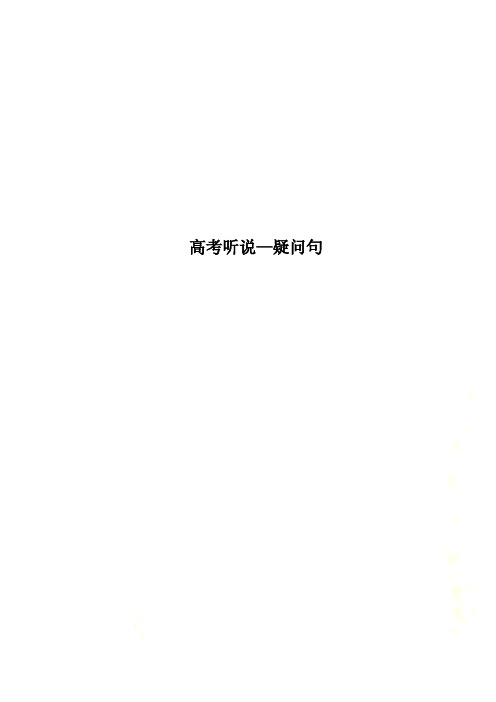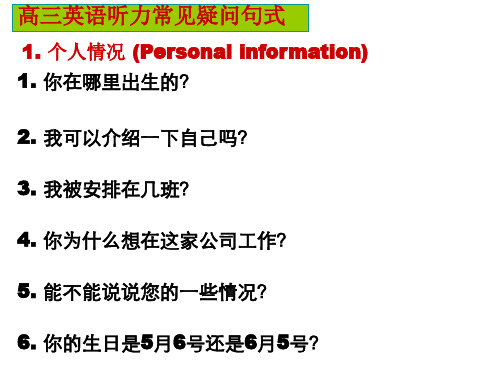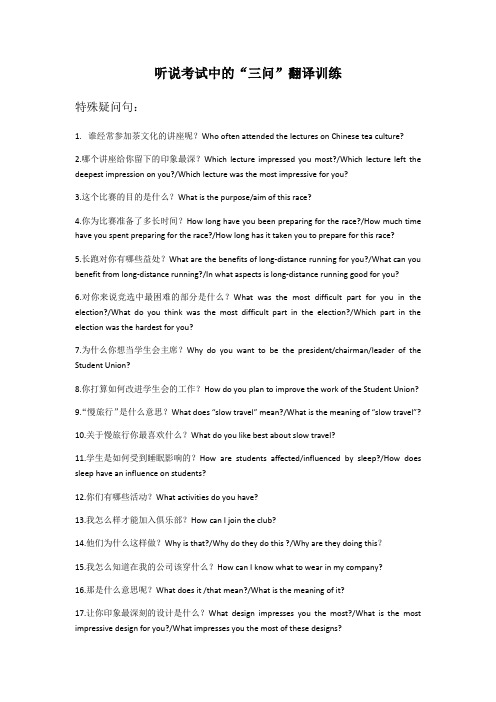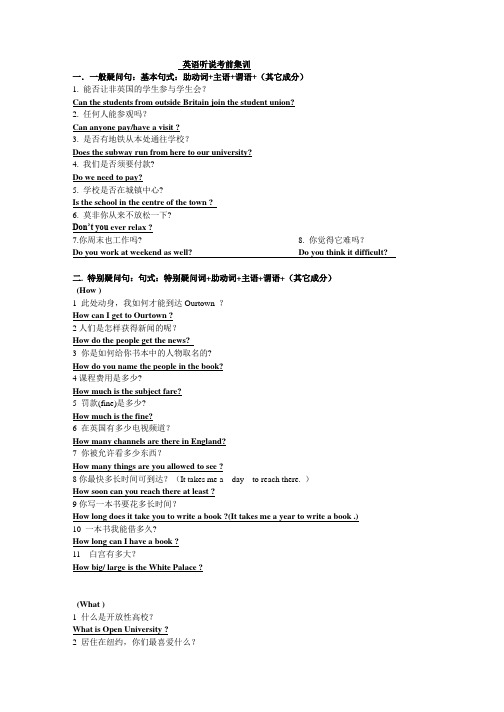听说训练----英语疑问句类型
高考听说—疑问句

高考听说—疑问句1.健康检查包括什么?(1) What the health check included?(2) What is the health check include?(3) What do the health check include?(4) What does the health check including?2.那么我需要呆在医院吗?(1) Does I need to stay in the hospital?(2) Am I have to stay in the hospital?(3) Did I need to stay in the hospital?3.我要避免吃一些特殊的食物吗?(1) Does I avoid to eat some special food?(2) Am I need to avoid eating several special food?(3) If I need to avoid eating some special food?三、用正确的助词或Be动词补全疑问句。
(1)James像你一样热爱音乐吗?___________ James love music as you do?(2)您能再多说点儿吗?____________ you please speak a little more?(3)英国人喜欢旧车吗?____________ the British people like old cars? (4)英语在高中和大学里重要吗?__________ English important in high school and university?(5)足球是不是谈话中的常用话题?________ football a common topic in conversation?(6)James小时候对什么感兴趣?What _______ James interested in when he was a kid? (7)这些规则有什么用处?What ________ these rules for?(8)你想在艺术学院学习?什么专业What major _____ you want to study in the art school?(9)你是如何发展出对历史的兴趣的?How _________ you develop the interest in history?四、实战演练。
广东省英语听说考试“三问”分类大全(含大量例句翻译)word版

广东省英语听说考试“三问”分类大全(含大量例句翻译)word版广东省听说Part B “三问”分类归纳大全1一般疑问句结构:be/助动词/情态动词+主语+其他成分?例句:花那么多时间在电脑游戏方面有必要吗?Is it necessary to spend so much time on computer games?你打算参加即将到来的运动会吗?Are you going to take part in the coming sports meeting?一个人的爱好和性格之间有什么关系吗?Is there any relations hip between one’s hobby and his character?住学校宿舍是否较便宜?Is it cheaper to live in a university dormitory than in a private house?你想来点奶酪吗?Would/Do you like some cheese?网上购物将会取代传统的购物方式吗?Will online shopping take the place of the traditional shopping?你是否拿了我放在桌面的钥匙?Did you take the key which put on the table by me?你是否知道这里禁止吸烟?Do you know that smoking is forbidden here?你还没有完成老师布置的作业?Haven’t you finished the h omework assigned by the teacher?2特殊疑问句结构:特殊疑问词+be/助动词/情态动词+主语+其他?1)what & which例句:今天星期几? What day is today?今天几号? What is the date today?今天天气如何?What is the weather like today?他们下一步打算做什么? What are they going to do next?David 加入了哪一组? Which group did David take part in?你打算到哪个大学学习?Which university are you going to study in?吸烟对我们有什么影响?What effect does smoking have on us?当我们学习英语时,应该注意什么?What should we pay attention to when we learn English?为了保持健康我们应该有什么样的饮食?What kind of diet should we have to keep healthy?这个男孩的妈妈年轻时喜欢干什么?What did the boy’s mother enjoy doing when she was young?2)who /whom when /where/why例句:谁将会做一个关于如何节约用水的讲座?Who will make a speech about how to save water?他们正在焦急地等待谁? Whom are they anxiously waiting for?商店的营业时间是? When is the shop open for business?你什么时候有空来看一下房子? When are you free to see the apartments?你在哪里找到你上周丢失的车?Where did you find the car that you lost last week?最近的汽车站在哪里? Where is the nearest bus station from here?他们为什么不喜欢传统的节日?Why don’t they like the traditional Festivals?Carl为什么不同意星期五做手术?Why doesn’t Carl agree to have the operation on Friday?说话者为什么为自己的健康担心? Why did the speaker worry about health?3)how / how often/ how much / how many / how long / how far…例句:时间怎么安排? How is the schedule arranged?Mary 和她的同学相处得怎么样?How does Mary get along with her classmates?这个女士多久要参加一次部门会议?How often does the woman attend the department meeting? 超市里一块饼干多少钱?How much is a piece of cake in the supermarket?火车单程票票价? How much do we pay for a single ticket?他们中有多少人下周四会动身去上海?How many of them will leave for Shanghai next Thursday?有多少人在事故中死亡? How many people were killed in the accident?从这个房子到最近的地铁有多远? How far is it from the house to the nearest subway station?你已经在这儿呆了多长时间了?How long have you stayed here?从本处乘火车到那个景点的时间?How long does it take to go by train from here to the place of interest?你要怎么去,坐火车还是乘飞机? How are you getting there,by train or by plane?3选择疑问句结构:一般疑问句+or+其他成分?/ 特殊疑问句+or+其他成分?例句:他喜欢呆在这儿还是回家? Does he prefer to stay here or go back home?你将搭乘飞机还是火车离开? Will you leave by air or by train?他何时动身去伦敦,今天还是明天?When will he leave for London, today or tomorrow?哪个城市大些,北京还是纽约? Which city is bigger, Beijing or New York?猫和狗你更喜欢哪一种? Which do you prefer, cats or dogs?4反义疑问句结构:陈述句+简短疑问(前肯定后否定;前否定后肯定)?例句:那里的天气并不冷,对吗?The weather there isn’t very cold, is it?你会参加这个周末的派对,是吗? You are going to the p arty this weekend, aren’t you?你一定把这事告诉她了,不是吗?You must have told her about it, haven’t you?我们将会永远记住这次的经历,对吗?We will remember this experience forever, won’t we?很多人日本人在地震中丧生,对吗?Many Japanese were killed in the earthquake, weren’t they?5变异问句例句:您能告诉我一些关于期中考试的事情?Can you tell me something about the Mid-term exam?您介意告诉我是谁负责这个部门吗?Would you mind telling me who is in charge of the department?他认为什么是最大问题? What does he consider is the biggest problem?你认为会议将会在哪里举行?Where do you suppose the meeting will take place?。
中学生高考英语必备材料11 翻译练习 听说考试 part B 常见疑问句式归类

5. 机票和每日三餐的费用都包含在费用内,是吗? 6. 最早的航班是什么时候?
17. 语言学习(Language learning) 1. 你还会说什么别的语言吗? 2. 你和外国人别吗? 4. 据说法语是世界上最美的语言,是吗? 5. 你觉得学习写作容易还是口语容易?
12. 饮食(Food and drink)
1. 你的咖啡要加糖吗? 2. 你每天几点吃晚饭? 3. 很多西方人也会用筷子,是吗?
4. 牛肉和猪肉,你更喜欢哪一种?
5. 你们有哪些中国菜? 6. 你觉得我昨天买的饮料怎么样?
13. 健康 (Health)
1. 你爸爸每个月都去看牙医吗?
2. 你多久爬一次山?
5. 美国成立于什么时候?
6. 中国人口最多的城市是哪一个?
23. 社会 (Society) 1.中国人对外国人很友好吗? 2.美国有多少种宗教信仰?
3.俄罗斯人冬天通常穿什么样的衣服?
4.中国和英国打招呼的方式不同,是吗? 5.在英国人们应该靠左边行走还是靠右边行走? 6.中国的义务教育是九年吗?
24. 文学与艺术 (Literature and art) 1.你读过鲁迅的小说吗? 2.这首歌的作曲者是谁?
3.这幅画是什么时候画的?
4.美国文学和英国文学你更喜欢哪一个?
5.达芬奇(Leonardo da Vinci )是意大利著名的画家, 是吗? 6.你认为这部戏剧怎么样?
8.人际关系(Interpersonal relationships) 1. 你家有几口人?
2. 我可以在这儿照相吗?
3. 下周我们一起去看电影,好吗? 4. 你爸爸和你妈妈,谁对你的影响最大?
5. 你知道离这儿最近的医院怎么走吗?
听说考试中的“三问”翻译训练

听说考试中的“三问”翻译训练特殊疑问句:1.谁经常参加茶文化的讲座呢?Who often attended the lectures on Chinese tea culture?2.哪个讲座给你留下的印象最深?Which lecture impressed you most?/Which lecture left the deepest impression on you?/Which lecture was the most impressive for you?3.这个比赛的目的是什么?What is the purpose/aim of this race?4.你为比赛准备了多长时间?How long have you been preparing for the race?/How much time have you spent preparing for the race?/How long has it taken you to prepare for this race?5.长跑对你有哪些益处?What are the benefits of long-distance running for you?/What can you benefit from long-distance running?/In what aspects is long-distance running good for you?6.对你来说竞选中最困难的部分是什么?What was the most difficult part for you in the election?/What do you think was the most difficult part in the election?/Which part in the election was the hardest for you?7.为什么你想当学生会主席?Why do you want to be the president/chairman/leader of the Student Union?8.你打算如何改进学生会的工作?How do you plan to improve the work of the Student Union?9.“慢旅行”是什么意思?What does “slow travel” mean?/What is the meaning of “slow travel”?10.关于慢旅行你最喜欢什么?What do you like best about slow travel?11.学生是如何受到睡眠影响的?How are students affected/influenced by sleep?/How does sleep have an influence on students?12.你们有哪些活动?What activities do you have?13.我怎么样才能加入俱乐部?How can I join the club?14.他们为什么这样做?Why is that?/Why do they do this ?/Why are they doing this?15.我怎么知道在我的公司该穿什么?How can I know what to wear in my company?16.那是什么意思呢?What does it /that mean?/What is the meaning of it?17.让你印象最深刻的设计是什么?What design impresses you the most?/What is the most impressive design for you?/What impresses you the most of these designs?18.这是个什么项目?What is this project about?/What is the idea of this project?19.为什么这么多家庭加入了这个项目?Why have so many families joined/taken part in/participated in this project?20.他们怎么做才能改变这种情况?How can they change this situation?/What can they do to change this situation?21.我该如何处理这个题目?How should I handle the topic?/What should I do with the topic?/How should I deal with the topic?22.这些技巧是什么?What are these skills?23.那是什么意思呢?What do you mean?24.游客能找到哪些工作呢?What kinds of jobs can the travelers find?25.机器人可以做哪些危险的工作?What kind of dangerous jobs can robots do?26.如果我们被机器人取代了该怎么办?What can we do if robots take place of us?27.为什么家长认为这是个问题?Why do parents think it is a problem?28.你有什么建议给家长呢?What is your advice for parents?29.那个医生是如何帮助你的?How did the doctor help you?30.网络医生看病的弊端是什么?What are the problems of seeing an e-doctor?31.你什么时候开始对丝绸历史感兴趣的?When did you begin to be interested in silk history?32.中国丝绸如何传播到其他国家?How was silk from China spread to other countries?33.丝绸工业的现状是什么?What is the silk industry like now?34.你怎么知道的呢?How did you know that?35.为什么运动能使我们更聪明?Why can sports make us smarter?36.运动如何帮助提升我们的课堂表现?How do sports help us improve class performance?37.在大家庭中成长是怎样的?What was it like growing up in a big family?/ How did you like growing up in a big family?/ What was growing up in a big family like?38.最艰难的部分是什么?What was the most difficult part?/ What was the hardest part?/ What was the toughest part?/ What was the most difficult thing?/ What was the hardest thing?/ What was the toughest thing?39. 你12岁时,学校是怎样的?How was the school when you were twelve?/ What was the school like when you were twelve?40. 最大的变化会是什么?What will the biggest change be?/ What is the biggest change going to be?/ What can the biggest change be?/ What will the greatest change be?/ What is the greatest change going to be?/ What can the greatest change be?41. 那是什么意思呢?What does that mean?/ What do you mean?42.作为老师,你怎样使用这个系统?How did you use the system as a teacher?/ As a teacher, how did you use the system?/ How did you use the system being a teacher?/ Being a teacher, how did you use the system?/ How did you use the system working as a teacher?43.你做什么让观众大笑?What do you do to let the audience laugh?/ What do you do to make the audience laugh?44.你是怎么成为一个喜剧演员的?How did you become a comedian?45.你从课程中学到了什么?What do you learn from the course?/ What do you study from the course?46.你怎么知道女性在学习语言方面做得更好?How do you know that women can do better in learning languages?47. 他们在行为上有什么差异?What are the differences in their behaviors?/ What is the difference about their behaviors?48.人们一般做些什么来减少压力呢?What do people usually do to reduce stress?/ What do people often do to reduce stress?/ What do people usually do to relax?/ What do people often do to relax?/ What do people usually do to relieve pressure?/ What do people often do to relieve stress?49.为什么压力可以是正能量呢?Why can stress be positive energy?/ Why can stress be positive thing?/ Why can pressure be positive energy?/ Why can stress be positive thing?50.什么是改变坏情绪最有用的方法?What is the most useful way to change a bad mood?/ What is the most useful way to change a bad feeling?/ What is the most useful thing to change a bad mood?/ What is the most useful thing to change a bad feeling?/ What is the most useful method to change a bad mood?/ What is the most useful method to change a bad feeling?/ What is the most effective way to change a bad mood?/ What is the most effective method to change a bad feeling?51.颜色怎样影响我们的情绪?How do colors affect our moods?/ How do colors influence our moods?/ How do colors affect our feelings?/ How do colors influence our feelings?/ How docolors have an influence on our moods?/ How do colors have an influence on our feelings?52.对你来说最大的挑战是什么?What is the biggest challenge to you?/ What is the greatest challenge to you?/ What is the biggest challenge for you?/ What is the greatest challenge for you?53.好老师有什么特点?What characteristics do good teachers have?/ What features do good teachers have?54.两者之间的区别是什么?What’s the difference between them?/ What’s the difference between the two?/ What are the differences between them?/ What are the differences between the two?55.我怎样才能加入这个协会呢?How can I join this club?56.回家乡的路上给你印象最深刻的是什么?What impressed you most on the way to your hometown?/ What impressed you best on the way to your hometown?/ What gave you the deepest impression on the way to your hometown?/ What was the most impressive thing on your way to your hometown?57.你现在更喜欢在哪儿过春节呢?Where do you prefer to spend the Spring Festival?/ Where do you like more to spend the Spring Festival?58.你怎么看待穿校服?How do you think about wearing school uniforms?/ What do you think of wearing school uniforms?/ What’s your opinion about wearing school uniforms?59.大学课程是怎样安排的?How are the university classes arranged?/ How are the university courses arranged?/ How are the college classes arranged?/ How are the college courses arranged?/ How are the classes arranged in university?/ How are the courses arranged in college?60.你们大学哪个系最好?Which department is the best in your university?/ Which is the best department in your university?/ Which department is the best in your college?/ Which is the best department in your college?61.颜色怎样影响我们的购买行为?How do colors affect our buying decisions?/How do colors influence our buying decisions?/How do colors influence our purchasing behavior?/How do colors affect our buying behavior?/How do colors influence our buying behavior?/How do colors affect our purchasing behavior?62.什么颜色对顾客更具吸引力?What color is more attractive to customers?/What color can attract customers more?/What color can appeal to more customers?/What color can attract people’s attention more?/What color can draw people’s attention more?63.你们怎么解决老人的健康问题?How do you solve old people’s health problem?/How do you deal with old people’s health problem?64.谁支付他们在这里的生活费用?Who pays for their living expenses here?/Who pays them for the living expenses here?65.他们的子女多久来看望他们一次?How often do their children come to see them?/How often do their children come to visit them?66.你为什么要离开父母生活呢?Why do you want to live without your parents?/Why do you want to leave your parents and live alone?67.谁支付你的生活费用?Who pays for your living costs?/Who pays for your living expenses?/Who pays you for the living costs?/Who pays you for the living expenses?68.你们家是什么时候开始养导盲犬的?When did your family begin to raise dogs for the blind?/When did your family start raising dogs for the blind?/When did your family begin raising dogs for the blind?/When did your family start to raise dogs for the blind?69.你们是如何训练这些狗的?How do you train these dogs?70.你第一天教课感觉如何?How do you feel the first day of teaching?/How was your first day of being a teacher?/How was your first day of teaching?71.为什么你认为自己能成为语言教师?Why do you think you can become a language teacher?/Why do you think you can be a language teacher?72.你父母喜欢中国的什么呢?What do your parents like about China?/What do your parents love about China?/What are your parents fond of about China?73.为什么你不买些京剧DVD作为礼物?Why don’t you buy some Beijing Opera DVDs as gifts?/Why don’t you buy some Beijing Opera DVDs as presents?/Why not purchase some Beijing Opera DVDs as presents?/Why not purchase some Beijing Opera DVDs as gifts?74.你打算给弟弟和妹妹买些什么礼物呢?What gifts do you plan to buy for your brother and sister?/What presents do you plan to buy for your brother and sister?/What presents do you plan to purchase for your brother and sister?/What gifts do you plan to purchase for your brother and sister?/What gifts do you decide to buy for your brother and sister?/What presents do you decide to buy for your brother and sister?/What gifts do you decide to purchase for your brother and sister?/What presents do you decide to purchase for your brother and sister?75.在将来的教室里互联网有什么用?What is the use of the Internet in the future classroom? / What is the Internet for in the futureclassroom? / What role will the Internet play in the future classroom?76.将来学生如何参加考试?How will students take exams in the future?77.将来学生需要学习什么?What will students need to study/ learn in the future? / What is necessary for students to learn/ study in the future?78.我怎样才能使他们共同工作呢?How can I make them work together? / How do I make them work as a team? / What can I do to make them work together?79.你认为什么时候召集开会最好呢?What do you think is best to call them for a meeting? / What do you think is the best time to call everyone for meeting? / When do you think is best to call a meeting?80.作为领导,我应该怎样对待团队成员呢?How should I treat my teammates as a leader? / How should I treat my team members as a monitor?81.哪些体育运动在英国最流行?What are the most popular sports in Britain/ England? / What sports are the most popular ones in Britain/ England?82.你什么时候下班?When do you finish work?/ What time are you off work?/When do you get off work?/ What time do you finish work?/ What time do you get off work?83.你们晚上有哪些活动?What do you do in the evenings?/ What activities do you have in the evenings?/ What are your evening activities?84.英国人喜欢什么样的礼物?What kind of presents/ gifts do the British people like?/ What kind of presents are the British people fond of?/ What kind of presents do the British like?85.我去别人家吃饭时,我要带些什么?What shall I take when I go to others’to have meals?/ What shall I take when I have meals at others’home?/ What should I take if I go to others’house for dinner?/What should I take if I visit others for dinner?/ What should I take if I am invited to others’for dinner?86.我怎样才能留下良好的印象呢?How can I leave a good impression?/ How can I make a good impression?/ What can I do to make a good impression?/ What can I do to leave a good impression?87.我应该知道的下一个重要事情是什么?What is the next important thing I should know?/ What is the next important thing I should be aware of?88.如果我不记得某一个英语词,改怎么办呢?What should I do if I don’t remember an English word?/ What should I do if I don’t remember some English word?/ What should I do if I forget one English word?/What if I forget an English word?89.你和你的室友相处得如何?How do you get along with your roommates?90.为什么你不直接与他们谈一谈?Why don’t you have a talk directly with them?91.你的老师的建议是什么?What are your teacher’s suggestions? /What is your teacher’s advice?92.我为什么不能与朋友们一起开车?Why can’t I drive with my friends?93.这些规则有什么用处?What are these rules for? / What’s the use of these rules?94.这本书有什么问题?What’s the problem of the book?95.为什么你认为情节难以相信?Why do you think the plot is hard to believe/ unbelievable?96.报纸怎么评论这本书?How do the newspapers comment on/upon this book?/ What are the newspapers’comments on this book?97.我一次可以借几本书呢?How many books can I borrow at one time?98.我可以借多长时间呢?How long can I keep the books?99.我如果还书晚了会怎么样?What will happen if I return the books late?100.你想在艺术学院学习什么专业?What subject do you want to study at the arts campus?101.你在这一领域得过奖吗?Have you won any races in this field?102.你是如何发展出对历史的兴趣的?How do you develop an interest in history?103.James 小时候对什么感兴趣?What was James interested in when he was young?104.谁给你们的影响最大?Who had the biggest effect/ influence on you? /Who influenced you most?105.你说的学习风格是什么意思?What do you mean by ―learning styles?106.你是如何学习外语的?How did you learn a foreign language?107.你如何看待在英国排队的事情?What do you think of queuing in England?108.那我该做什么呢?What should I do?109.我还需要注意什么吗?What else should I pay attention to?110.你什么意思呢?What do you mean?一般疑问句:1.你们也邀请其他人吗?Did you also invite other people?2.度假公寓容易找吗?Is it easy to find a holiday apartment?3.睡眠好还有其他什么好处吗?Are there any other benefits of good sleep?/Does good sleep have any other benefits?/Are there any other advantages of good sleep?4.那意味着我们应该多睡觉吗?Does that mean we should sleep more?5.提问真的那么难吗?Is it really so hard to ask question?6.那意味着我可以穿任何衣服吗?Does that mean I can wear any clothes?7.这栋大楼里还有其他新的设计吗?Are there any other new designs in this building?8.你能告诉我该怎么做吗?Can you tell me what to do?/Can you tell me how to do it?/Can you tell me what I should do?9.你有很多空闲时间旅游吗?Did you have a lot of free time for traveling?10: 你认为机器人有一天会取代人类吗?Do you think that robots will replace humans one day?11.这仅仅发生在童年吗?Does it only happen in childhood?12.现在有很多人以这种形式看病吗?Do many people see their doctors in this way nowadays?13.年幼的孩子比年长的孩子更幸运吗?Are younger children luckier than the elder children?/ Are younger children more fortunate than the elder children?14.你认为体育活动将是一样的吗?Do you think that sports will be the same?/ Will sports be the same in your opinion?15.学生们喜欢这种交作业的方式吗?Did the students like the way to submit assignments?/ Did the students like the way of submitting assignments?/ Did the students like the way to handin homework?/ Did the students like the way of handing in homework?/ Did the students like the way to hand in assignments?/ Did the students like the way of handing in assignments?16. 有什么成功的秘诀吗?Do you have any secrets to success?/ What secrets to success do you have?/ Are there any secrets to success?17.你做过这个话题的研究吗?Have you done the research about the topic?/ Have you done the survey about the topic?/ Have you researched the topic?/ Have you studied the topic?18.音乐有助于改变坏情绪吗?Is music helpful to change a bad mood?/ Is music helpful to change a bad feeling?/ Does music contribute to changing a bad mood?/ Does music contribute to changing a bad feeling?/ Is listening to music helpful to change a bad mood?/ Is listening to music helpful to change a bad feeling?19.你认为每个人都可以被培训成好老师吗?Do you think that everyone can be trained to be a good teacher?/ Do you think that everyone can be trained to become a good teacher?/ Do you think everyone can be trained as a good teacher?/ Can everyone be trained to be a good teacher?/ Can everyone be trained to become a good teacher?20.我需要参加每一次的活动吗?Do I need to attend every activity?/ Do I need to take part in every activity?/ Do I need to participate in every activity?/Do I need to attend each activity?/Do I need to take part in each activity?/Do I need to participate in each activity?/Is it necessary for me to attend every activity?/Is it necessary for me to take part in each activity?21你的家乡离这里远吗?Is your hometown far from here?22.穿同样的衣服不烦吗?Isn’t it boring to wear the same clothes?/ Isn’t wearing the same clothes boring?/ Don’t you feel bored to wear the same clothes?23.你小时候穿校服吗?Did you wear school uniforms when you were young?/ Did you wear school uniforms when you were a kid?/ Did you wear school uniforms when you were a child?/24.你们大学会给学生提供出国学习的机会吗?Question 2: Does your university offer the students a chance to study abroad?/ Does your university give the students a chance to study abroad?/ Does your university provide the students with a chance to study abroad?/ Does your college offer a chance to study abroad to the students?/ Does your college give a chance to study abroad to the students?/ Does your university provide the students with a chance to study abroad?25.绿色是广告中流行的颜色吗?Question 3:Is green a popular color in advertising?/Is green a fashionable color in advertising?26.你父母通常允许你自己做决定吗?Do your parents usually allow you to make decisions by yourself?/Do your parents usually permit you to make decisions by yourself?27.你在街上见到过你们训练的狗吗?Did you see the dogs you trained in the street?/Did you see the dogs you trained on the road?/Have you seen the dogs you trained before in the street?/Have you seen the dogs you trained before on the road?28.你不是说你想当一名语言教师吗?Question 1:Didn’t you say you wanted to be a language teacher?/Didn’t you say you wanted to become a language teacher?/Didn’t you say you wanted to work as a language teacher?29.体育运动在英国中学和大学里重要吗?Is sport important in British middle schools and universities? / Are sports important in British high schools and universities?30.体育运动是不是谈话中的常用话题?Is sports a common topic in conversation? / Is sports the thing most talked about?31.你经常带工作回家吗?Do you often bring work home?/ Do you often take work home?32.我还要带其它衣服吗?Shall I take other clothes?/ Do I need to take other clothes?/ Do I have to take other clothes?/ Is it necessary for me to take other clothes?33.我真的需要这些规则吗?Do I really need these rules? / Are these rules necessary for me?34.James 像你一样热爱音乐吗?Does James like music as much as you?35.你能再多说点吗?Could you please speak a little more?36.你能说说英国人吗?Can you talk about English people?37.你还有别的困难吗?Do you have any other problems?38.你觉得我需要吃药吗?Do you think I need to take some medicine?39.英国人喜欢旧车吗?Does the British people like cars?反义疑问句:1.英国人不太在乎穿什么衣服,对吗?The British people care little about clothes, do they?。
听说考试part2三问部分基本结构常用句型及真题翻译

• 2. 你说的学习风格是什么意思?
• What do you mean by “learning styles?”
• 3. 你是如何学习外语的?
• How did you learn a foreign language?
•
• 2011真题C Part B Role Play
• 情景介绍: 角色:你是学生
任务:(1)向英国老师询问英国人对旧物 品的态度;
(2)根据谈话内容回答问题。 生词:registration plate 车牌
•1.英国人喜欢旧车吗?
•Does the British people like cars?
•2.你什么意思呢?
•What do you mean?
•3.英国人不太在乎穿什么衣服,对吗?
• Who had the biggest effect/ influence on you?
•
• 2011真题B Part B Role Play
• 角色:你是学生
• 任务:(1)采访Dr Brown 有关外语学习的问题
。
•
(2)根据谈话内容回答问题。
• 1. 你能再多说点吗?
• Could you please speak a little more?
听说考试part2三问部分基 本结构常用句型及真题翻译
•
•句型训练
•一般疑问句句型: •be/助动词/情态动词+主语+其他成分?
•
•
•一般疑问句练习一: • be:•is/am/are; was/were •其他成分: •n./ adj./ prep. phrase/ doing/ done
•他们是好学生吗?•Are they good students? •他对英语感兴趣吗?•Is he interested in English? •她的生日是在8月10号吗? •Is her birthday on August 10th ? •他们正在找工作吗? •Were they hunting for jobs? •这允许抽烟吗? • Is smoking permitted here?
高考听说-三问五答

英语听说考前集训一.一般疑问句:基本句式:助动词+主语+谓语+(其它成分)1. 能否让非英国的学生参与学生会?Can the students from outside Britain join the student union?2. 任何人能参观吗?Can anyone pay/have a visit ?3. 是否有地铁从本处通往学校?Does the subway run from here to our university?4. 我们是否须要付款?Do we need to pay?5. 学校是否在城镇中心?Is the school in the centre of the town ?6. 莫非你从来不放松一下?Don’t you ever relax ?7.你周末也工作吗? 8. 你觉得它难吗?Do you work at weekend as well? Do you think it difficult?二. 特别疑问句:句式:特别疑问词+助动词+主语+谓语+(其它成分)(How )1 此处动身,我如何才能到达Ourtown ?How can I get to Ourtown ?2人们是怎样获得新闻的呢?How do the people get the news?3 你是如何给你书本中的人物取名的?How do you name the people in the book?4课程费用是多少?How much is the subject fare?5 罚款(fine)是多少?How much is the fine?6 在英国有多少电视频道?How many channels are there in England?7 你被允许看多少东西?How many things are you allowed to see ?8你最快多长时间可到达?(It takes me a day to reach there. )How soon can you reach there at least ?9你写一本书要花多长时间?How long does it take you to write a book ?(It takes me a year to write a book .)10 一本书我能借多久?How long can I have a book ?11 白宫有多大?How big/ large is the White Palace ?(What )1 什么是开放性高校?What is Open University ?2 居住在纽约,你们最喜爱什么?Living in Newyork , what do you like most ?3 怎么看待电视上的广告?What do you think of the advertisement on TV ?4你怎样看待美国人的独立性格?What do you think of the independent character of Americans ?5我觉得很难记住外国人名字甚至他们的面孔,你呢?I find it difficult to remember the names of the foreigners even their faces, what about you ? 6纽约市政府目前应当立刻解决的问题是什么?What problem should the New York Government solve at once ?7你5点起床以后做什么事?What do you do after you get up at 5 ?8那里卖些什么东西?What thing does it sell there?9 他们得到了什么惩处?10这些课程在星期几?What punishment did they get ? What days are the classes on?(where)1. 你从哪里来?Where do you come from? 或Where are you from?2.《哈利. 波特》这本书的构思从哪里来?Where does the idea of the book Harry Porter come from?(When)1.邮局的营业时间?When are post offices open for business?2.玛丽诞生于什么时候?When was Mary born?(Which)选择疑问句1. 哪路公车会到那里?Which bus will get there?2. 哪个更坏,偷东西还是造成别人损害?Which is worse, stealing things or hurting others?Have & There be1. 在读报纸和杂志上的新闻方面,我们有更多的自由吗?Do we have more freedom on reading newspaper and magazine?2.在路上有什么须要留意的吗?Is there anything to pay attention to on the way?3.有什么你们不喜爱的东西吗?Is there anything that you don’t like ?4.有什么解决环境污染的方法吗?Is there any quick solution to the environmental pollution?三、反义疑问句句式:前后助动词一样,前肯后否,前否后肯。
广东高考英语听说考试中的疑问句

计算机视频对话(约1分钟,样题是52秒,只播1遍) A:„ B:„ A:„ 五答 B:„ (机问 考生答) 机问1 考生答 三问 机问2 考生答 机问3 考生答 考生问1 机回答 机问4 考生答 考生问2 机回答 机问5 考生答 考生问3 机回答
你要去哪儿,教室还是图书馆?
Where are you going ,to the
classroom↗ or to the library ↘ ?
反意疑问句
反意疑问句由两部分组成:前一部 分是一个陈述句,后一部分是一个 简短的疑问句,两部分的人称时态 应保持一致。
原则: 前肯,后否; 前否,后肯!
你喜欢踢足球还是打篮球?
________________________________ Do you like playing football ↗ or basketball? ↘ _____________
2.特殊疑问句,A or B
你更喜欢喝什么,茶还是牛奶?
Which one do you prefer,tea ↗or milk ↘ ?
一般疑问句的结构
be / 情态动词 / 助动词 +主 语+谓语/表语+(其他),
be: am, is, are, was , were 肯定回答: 情态动词: can, may, need, must, will… Yes, 主语+ bedoes, (情态动词、助动词 ) 助动词 : do, did , will, have… 否定回答: No,主语+be (情态动词、助动词)+ not.
Translate the sentences into English
• • • • 1. James像你一样热爱音乐吗? Does James love music like you? 2. James小时候对什么感兴趣? What did James like when he was young? What was James interested in when he was young? • 3. 谁给你们的影响最大? • Who has/had the biggest influence on you?
一般疑问句 听力训练

一般疑问句听力训练
以下是关于听力训练的一般疑问句:
1. Are you listening carefully? 你听仔细了吗?
2. Do you have any questions about the listening material? 你对听力材料有任何疑问吗?
3. Can you understand the main idea of the passage? 你能理解文章的主要意思吗?
4. Do you need more time to finish the listening exercises? 你需要更多时间来完成听力练习吗?
5. Have you ever had any problems with your hearing? 你曾经有过听力问题吗?
6. Do you find it difficult to understand fast-spoken English? 你觉得快速说英语很难理解吗?
7. Are you following the conversation well? 你能很好地理解对话吗?
8. Do you need any help with your listening comprehension? 你的听力理解需要帮助吗?
9. Do you have any specific areas where you struggle with listening? 你在听力方面有任何特别困难的地方吗?
10. Are you ready to start the listening section of the exam? 你准备好开始考试听力部分了吗?
希望这些一般疑问句可以帮助你进行有效的听力训练。
- 1、下载文档前请自行甄别文档内容的完整性,平台不提供额外的编辑、内容补充、找答案等附加服务。
- 2、"仅部分预览"的文档,不可在线预览部分如存在完整性等问题,可反馈申请退款(可完整预览的文档不适用该条件!)。
- 3、如文档侵犯您的权益,请联系客服反馈,我们会尽快为您处理(人工客服工作时间:9:00-18:30)。
听说训练---角色演练答题技巧(三问五答)听说训练中的三问其实就是汉译英的过程,准确翻译,大声说出,并注意语音语调即可。
关键在于正确使用疑问句的类型和句子的时态。
在角色演练中常考的时态有:一般现在时,一般过去时,一般将来时,现在完成时,以及含有情态动词的句子。
所有疑问句中必须有以下三类词中的某一类构成:1.be动词,体现在时态中:am, is, are, was, were2.助动词:do, does,(一般现在时) did(一般过去时), will, shall(一般将来时),have/ has(现在完成时)3.情态动词:can, could, should, may, must,一.三问——-疑问句的种类:I.一般疑问句:结构:情态动词/ 助动词/ be + 主语 + 谓语 + 其它语调:句末用升调。
注意:1。
若汉语中出现“是否”的字眼时,用一般疑问句即可表达此意,千万不要再加if 或whether ;2. 若有“难道”字眼时,可用否定式的一般疑问句表达。
3。
若有“请。
好吗?”可用表示客气请求的“Will / Would you please…?”来表达。
Eg: 他们是否已经离开了? Have they left yet ?难道你没有收到邀请吗? Didn’t you receive the invitation ?请你等多一会儿好吗? Would you please wait longer ?II.特殊疑问句:结构:[句型1] 特殊疑问词 + 一般疑问句[句型2] 特殊疑问词 + 谓语动词 + 其他成分,(疑问词本身做主语)[句型3] 特殊疑问词 +do you think/believe/ guess/ + 主语 + 谓语 + 其他成分[句型4] 特殊疑问词 +do you think/believe/ guess/ + 谓语 + 其他成分Eg: a. What did she buy for his birthday?b. Who took away my mobile phone?c. Why do you think he lost his job?d. What do you believe led to the fire?语调:句末用降调注意:1。
问一个地方有多少人口,用what (what’s the population of …..),不用how many population;2. 问数目,号码或温度是多少等也用what ;3.问多久做一次某事,用how often, 用every…, once a week, twice a month, three times..等回答。
Eg: a 这个城市人口是多少?What is the population of the city ?b. 明天的气温是多少?What will the temperature be tomorrow ?c. 你多久回一次家?How often do you go home?d. 你多久回去看一次父亲?How often do you go home to see your father ? III.选择疑问句结构:一般疑问句或特殊疑问句, A or B ?语调:前升后降注意:答语必须是完整的句子或省略回答,不能用yes或no来回答。
Eg: a. Did you attend the university or began to work after graduation?b. Do you prefer to play football or stay at home ?c Which do you like best, football, basketball or ping pong ball?IV. 反意疑问句: 汉语中常含有“是吗”或“对吗”的字眼。
结构:陈述句 + 简略问句?规则:前肯定,后否定;前否定,后肯定。
语调:常用升调Eg: a. Mike likes playing basketball, doesn’t he?b. You are good at English, aren’t you?c. They have already seen the film, haven’t they?Ex: 补全下列反意疑问句。
1.You come from South Africa, ______________________?2.Her mother worked as a teacher in China two years ago, ___________________?3.You have never seen the picture before, _________________________?4.Mrs. Brown made a beautiful birthday cake for her son, ____________________?5.There isn’t anything wrong with my computer, ______________________?6.Your father didn’t return this city, _____________________?7.Your school is far away from your home, _____________________?8.The students love to do after-class activities, ___________________?9.It will be extremely cold next week,_____________________?10.You could play the piano when you were young, _____________________?1.常问对某物的看法时,汉语“你觉得…怎么样?”或者“你认为…. 怎么样?”,用句型:a. What do you think of…….?b. How do you like…?c. Do you think……?2. 提建议时,问“…怎么样?”,用句型“How about…..?”“What about….?”3. 问对方最喜欢什么,用句型“What’s your favorite …?”“ What do you like best?”4. 问对方曾经做过某事,用句型“Have you ever… ?”5. 汉语中有以下字眼可断定时态:“了”-----一般过去时“要/会”--------一般将来时“过”--------现在完成时6. 注意被动语态的使用。
例如:“电脑修理了吗?” Was the computer repaired ?Ex I: Translate the sentences.1.你见过Amily的父母吗?_____________________________________________________________2.你认为他很聪明吗?__________________________________________________________________3.去韩国度假怎么样?__________________________________________________________________4.你最喜欢的运动项目是什么?__________________________________________________________5.你觉得他的新书怎么样?______________________________________________________________EX 2: Translate the following Chinese into English.(标出语调)1.你上周去看望你奶奶了吗?____________________________________________________________2.你和你的室友相处得怎么样?__________________________________________________________3.昨天晚上谁在公寓里开派对?__________________________________________________________4.你的邻居性格如何?__________________________________________________________________5.你哥哥看上去比你高大强壮,是吗?____________________________________________________6.你爸爸以前是足球运动员还是篮球运动员?______________________________________________7.他上课为什么总是迟到?____________________________________________________________8.难道你不喜欢你邻居家的狗吗?______________________________________________________9.你的弟弟有多重?__________________________________________________________________10.你的老板在上海出差,是吗?___________________________________________________________11.你的同事喜欢开车上班还是坐公交上班?________________________________________________12.你爷爷多久体检一次?________________________________________________________________13.你周围有很多人吸烟,是吗?_________________________________________________________14.你最想念家乡的什么?________________________________________________________________15.你们学校有几个食堂?________________________________________________________________16.医院附近有银行吗?__________________________________________________________________17.你妈妈空闲时喜欢去商场还是超市?____________________________________________________18.你家乡的很多河流都已经干涸,是吗?__________________________________________________19.从网上下载音乐很方便,不是吗?_______________________________________________________20.你想在哪儿就餐,食堂还是餐馆?_______________________________________________________21.你认为他是一位好老师吗?____________________________________________________________22.他是一名经验丰富的老师,是吗?______________________________________________________23.业余时间你做什么?__________________________________________________________________24.你能给我讲讲你的爱好吗?____________________________________________________________25.他热衷于收集邮票,是吗?____________________________________________________________26.你喜欢现代音乐还是古典音乐?________________________________________________________27.你妈妈什么时候学校打羽毛球的?______________________________________________________28.台风给这个地方带来了很大的破坏吗?__________________________________________________29.保持健康的生活方式很难,对吗?________________________________________________________30.你要在美国待多久?__________________________________________________________________二五答信息:来自何处?I.出处:视频对话 + 考生三问机答对话部分,视频对话含2个小题的信息点,机答部分含3个小题的信息点,所以5个问题的答案信息点来源大致可以如下表达:计算机视频对话(约1分钟,只播一遍)A:………B:………A:………B:…….三问(考生问,机答)五答(机问,考生答)考生第1问机答机问1 考生答考生第2问机答机问2 考生答考生第3问机答机问3 考生答机问4 考生答机问5 考生答II.回答时要注意什么?1.注意力要集中在谈话内容上,不要被视频所分散。
